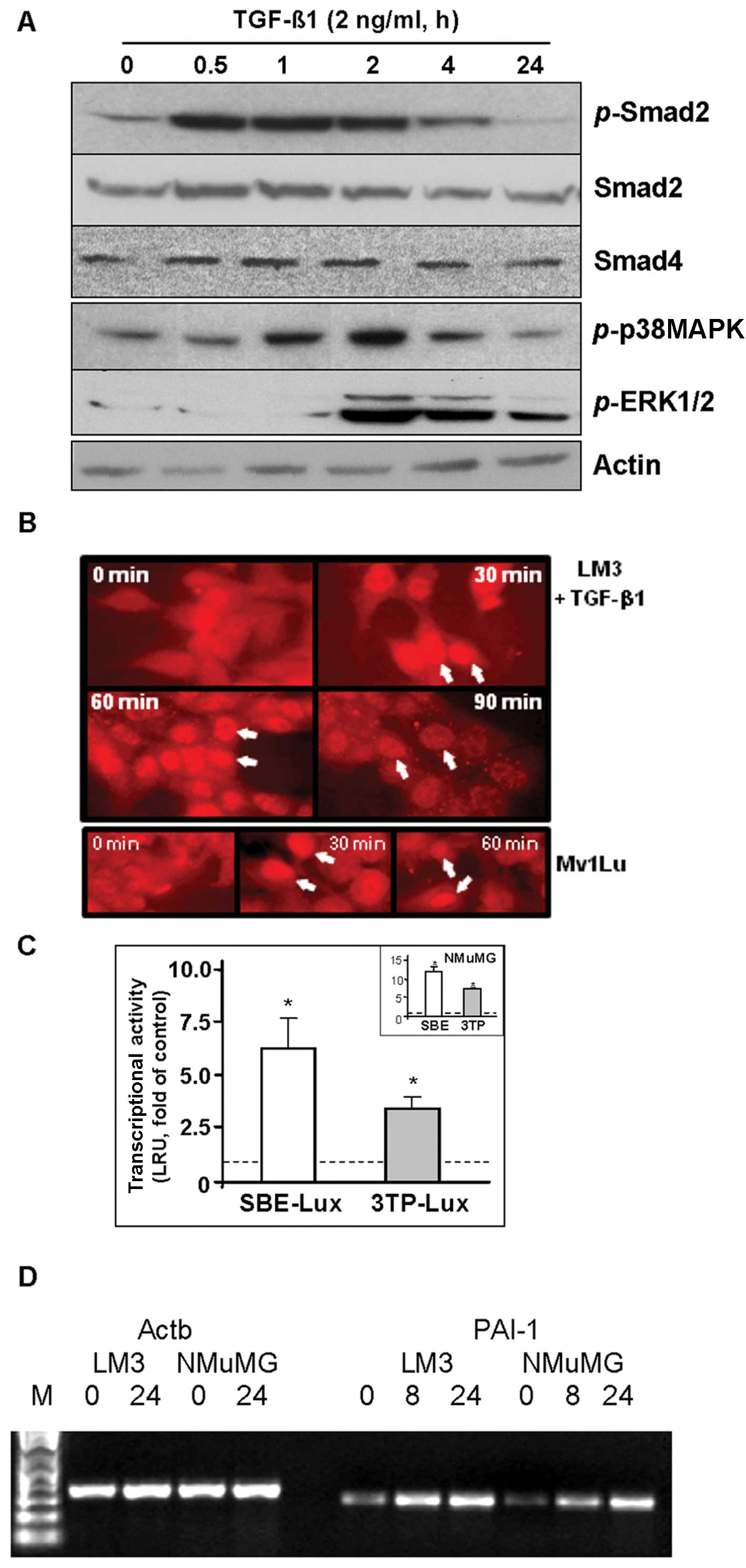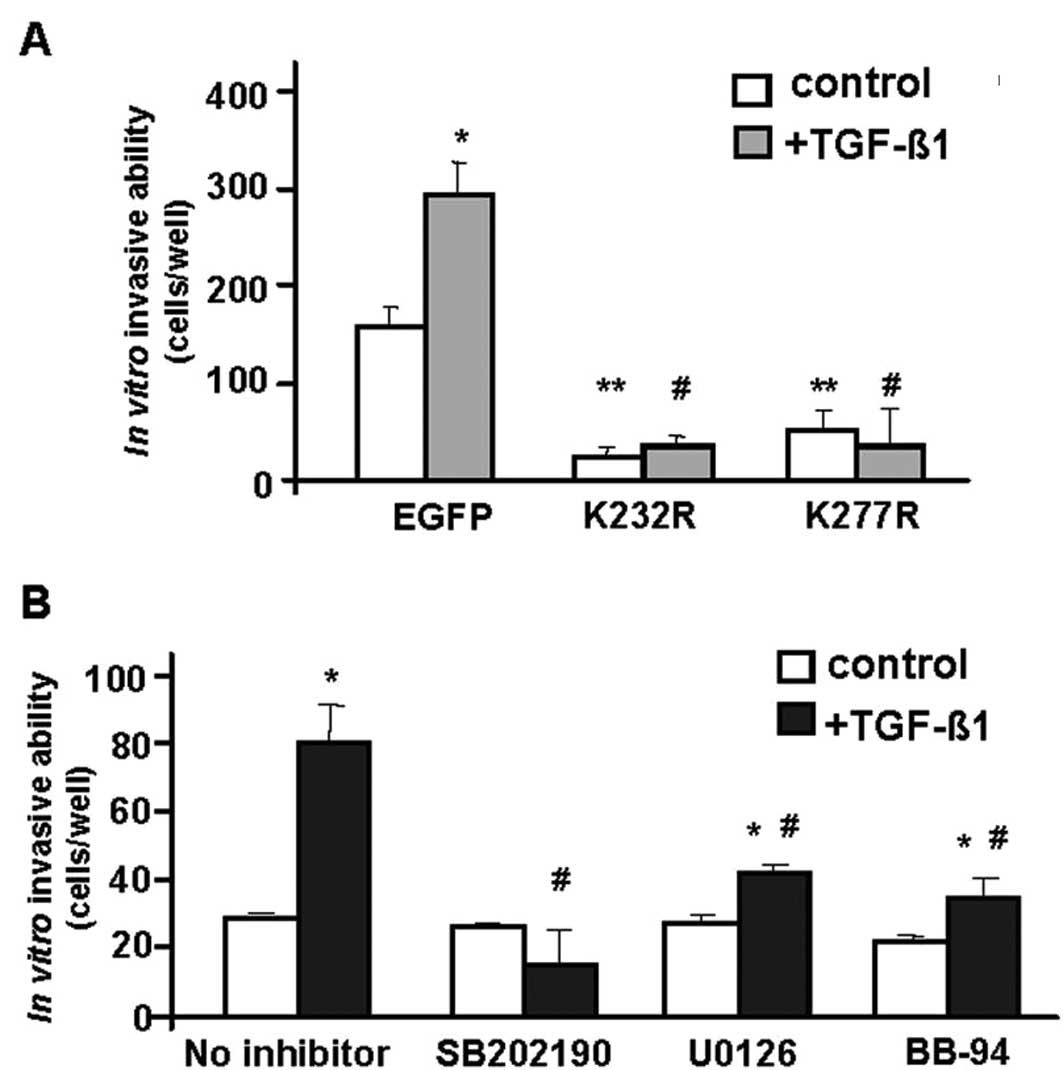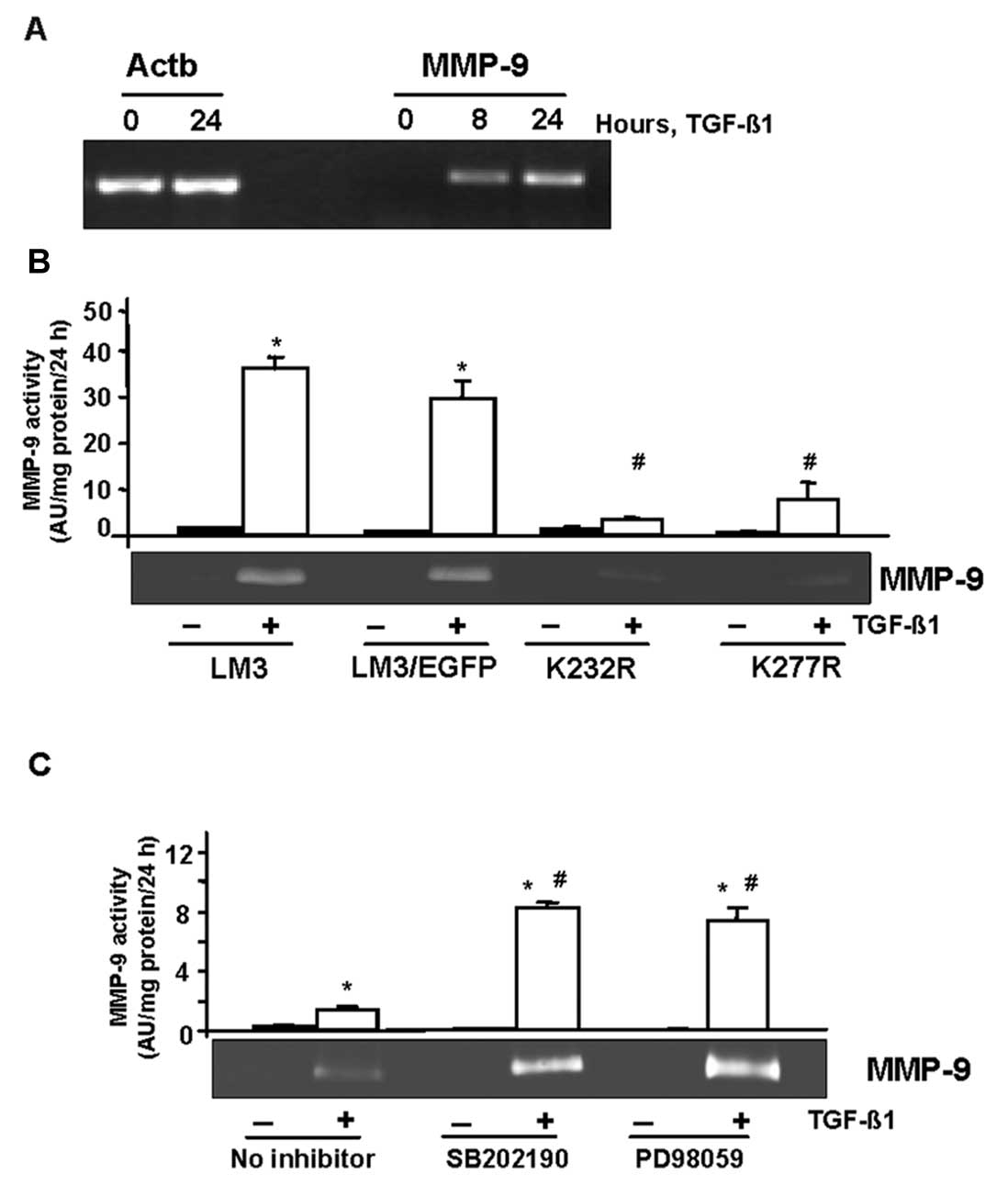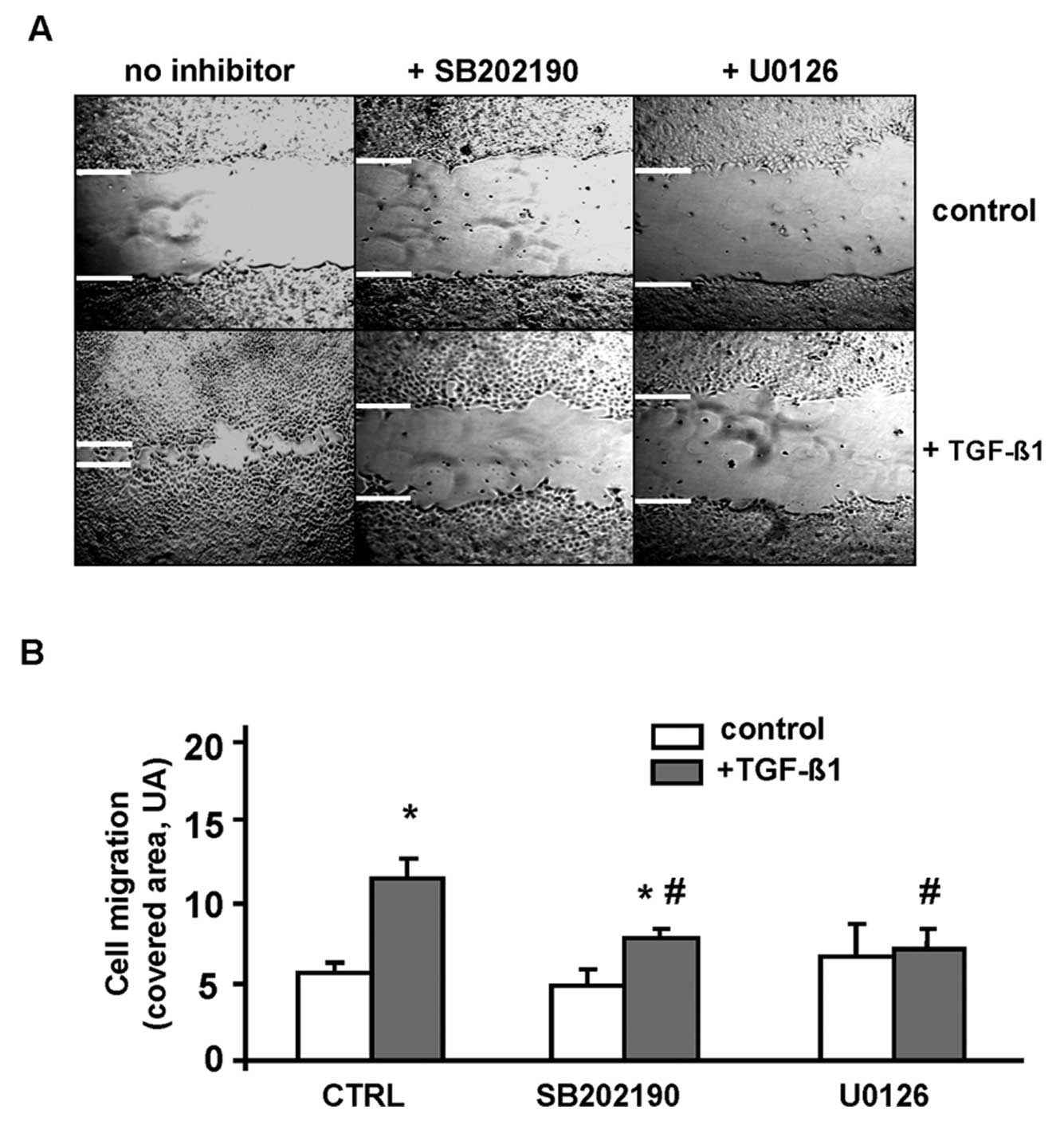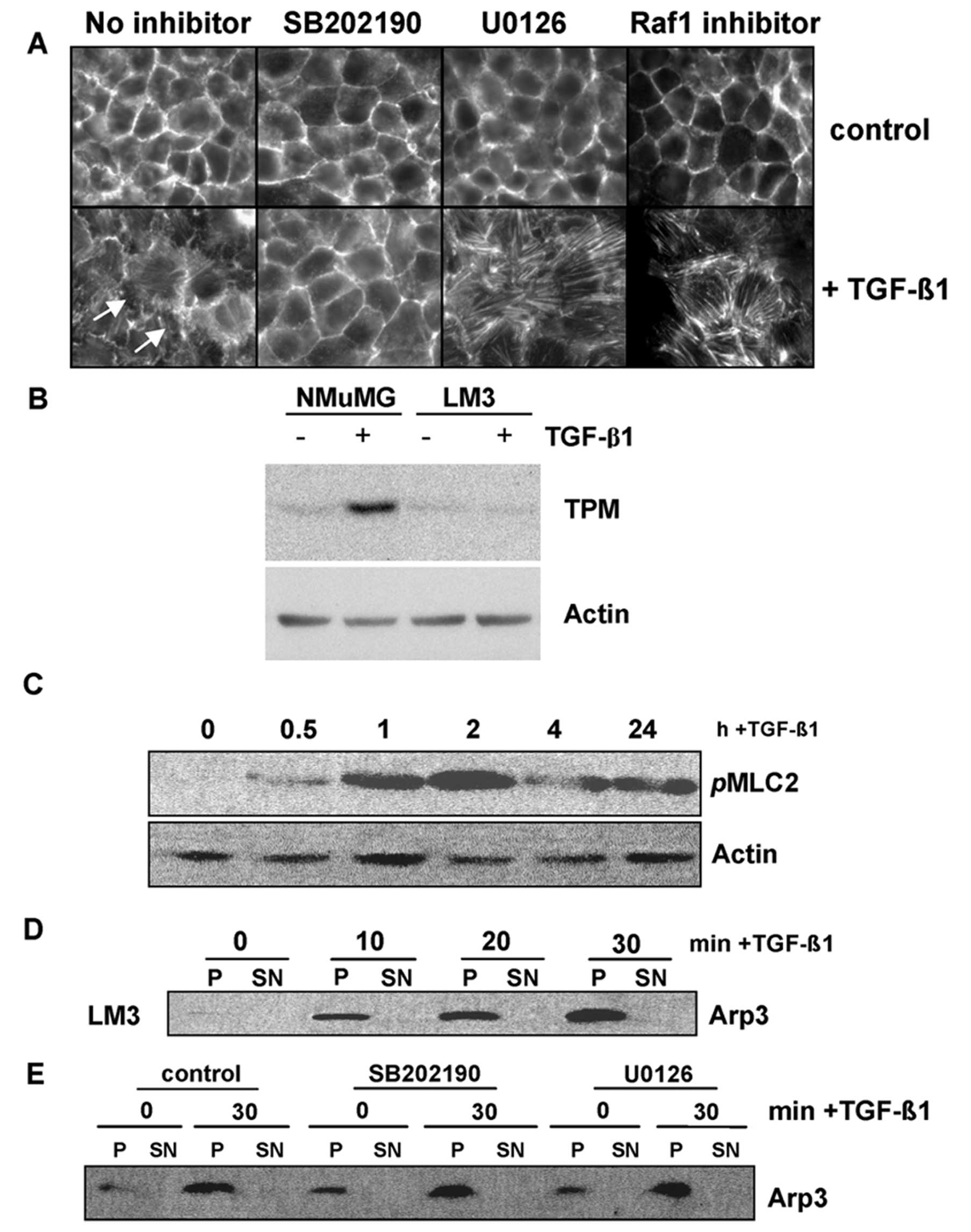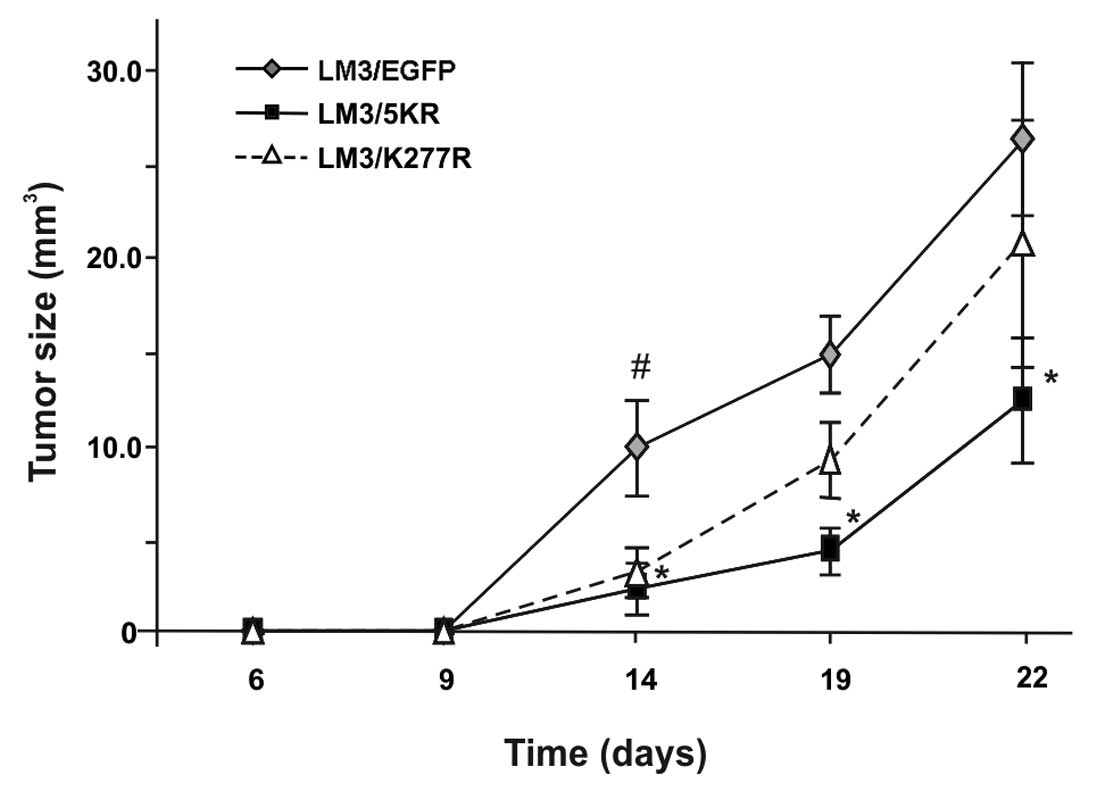|
1
|
Hunter KW, Crawford NP and Alsarraj J:
Mechanisms of metastasis. Breast Cancer Res. 10(Suppl 1): S22008.
View Article : Google Scholar
|
|
2
|
Roberts AB and Wakefield LM: The two faces
of transforming growth factor beta in carcinogenesis. Proc Natl
Acad Sci USA. 100:8621–8623. 2003. View Article : Google Scholar : PubMed/NCBI
|
|
3
|
Moustakas A and Heldin CH: Signaling
networks guiding epithelial-mesenchymal transitions during
embryogenesis and cancer progression. Cancer Sci. 98:8621–8623.
2007. View Article : Google Scholar
|
|
4
|
Li Mo, Wan YY, Sanjabi S, Robertson AK and
Flavell RA: Transforming growth factor-β regulation of immune
responses. Annu Rev Immunol. 24:99–146. 2006.
|
|
5
|
Enholm B, Paavonen K, Ristimaki A, et al:
Comparison of VEGF, VEGF-B, VEGF-C and Ang-1 mRNA regulation by
serum, growth factors, oncoproteins and hypoxia. Oncogene.
14:2475–2483. 1997. View Article : Google Scholar : PubMed/NCBI
|
|
6
|
Christofori G: New signals from the
invasive front. Nature. 441:444–450. 2006. View Article : Google Scholar : PubMed/NCBI
|
|
7
|
Safina A, Vandette E and Bakin AV: LK5
promotes tumor angiogenesis by upregulating matrix
metalloproteinase-9 in tumor cells. Oncogene. 26:2407–2422. 2007.
View Article : Google Scholar : PubMed/NCBI
|
|
8
|
Muraoka RS, Dumont N, Ritter CA, et al:
Blockade of TGF-β inhibits mammary tumor cell viability, migration,
and metastases. J Clin Invest. 109:1551–1559. 2002.
|
|
9
|
Yang YA, Dukhanina O, Tang B, et al:
Lifetime exposure to a soluble TGF-β antagonist protects mice
against metastasis without adverse side effects. J Clin Invest.
109:1607–1615. 2002.PubMed/NCBI
|
|
10
|
Elliott RL and Blobe GC: Role of
transforming growth factor beta in human cancer. J Clin Oncol.
23:2078–2093. 2005. View Article : Google Scholar : PubMed/NCBI
|
|
11
|
Stover DG, Bierie B and Moses HL: A
delicate balance: TGF-β and the tumor microenvironment. J Cell
Biochem. 101:851–861. 2007.
|
|
12
|
Saunier EF and Akhurst RJ: TGF beta
inhibition for cancer therapy. Curr Cancer Drug Targets. 6:565–578.
2006. View Article : Google Scholar : PubMed/NCBI
|
|
13
|
Pollard TD and Borisy GG: Cellular
motility driven by assembly and disassembly of actin filaments.
Cell. 112:453–465. 2003. View Article : Google Scholar : PubMed/NCBI
|
|
14
|
Bakin AV, Safina A, Rinehart C, Daroqui C,
Darbary H and Helfman DM: A critical role of tropomyosins in TGF-β
regulation of the actin cytoskeleton and cell motility in
epithelial cells. Mol Biol Cell. 15:4682–4694. 2004.
|
|
15
|
Zavadil J and Bottinger EP: TGF-beta and
epithelial-to-mesenchymal transitions. Oncogene. 24:5764–5774.
2006. View Article : Google Scholar
|
|
16
|
Zheng Q, Safina A and Bakin AV: Role of
high-molecular weight tropomyosins in TGF-β-mediated control of
cell motility. Int J Cancer. 122:78–90. 2008.
|
|
17
|
Farina AR, Coppa A, Tiberio A, et al:
Transforming growth factor-β1 enhances the invasiveness of human
MDA-MB-231 breast cancer cells by up-regulating urokinase activity.
Int J Cancer. 75:721–730. 1998.
|
|
18
|
Safina A, Varga AE, Bianchi A, Zheng Q,
Kunnev D, Liang P and Bakin AV: RAS alters epithelial-mesenchymal
transition in response to TGF-β by reducing actin fibers and
cell-matrix adhesion. Cell Cycle. 8:284–298. 2009.PubMed/NCBI
|
|
19
|
Daroqui CM, Puricelli LI, Urtreger AJ, Bal
de Kier Joffé E, Elizalde PV and Lanuza GM: Involvement of
TGF-β/TβRs system in tumor progression of murine mammary
adenocarcinomas. Breast Cancer Res Treat. 80:287–301. 2003.
|
|
20
|
Urtreger AJ, Ghiso JAA, Werbajh SE,
Puricelli LI, Muro AF and Bal de Kier Joffé E: Involvement of
fibronectin in the regulation of urokinase production and binding
in murine mammary tumor cells. Int J Cancer. 82:748–753. 1999.
View Article : Google Scholar : PubMed/NCBI
|
|
21
|
Bakin AV, Rinehart C, Tomlinson AK and
Arteaga CL: p38 mitogen-activated protein kinase is required for
TGFβ-mediated fibroblastic transdifferentiation and cell migration.
J Cell Sci. 115:3193–3206. 2002.
|
|
22
|
Oft M, Heider KH and Beug H: TGFβ
signaling is necessary for carcinoma cell invasiveness and
metastasis. Curr Biol. 8:1243–1252. 1998.
|
|
23
|
Dennler S, Itoh S, Vivien D, ten Dijke P,
Huet S and Gauthier JM: Direct binding of Smad3 and Smad4 to
critical TGF beta-inducible elements in the promoter of human
plasminogen activator inhibitor-type 1 gene. EMBO J. 17:3091–3100.
1998. View Article : Google Scholar : PubMed/NCBI
|
|
24
|
Chomczynski P and Sacchi N: Single-step
method of RNA isolation by acid guanidinium
thiocyanate-phenol-chloroform extraction. Anal Biochem.
162:156–159. 1987. View Article : Google Scholar : PubMed/NCBI
|
|
25
|
McEarchern JA, Kobie JJ, Mack V, et al:
Invasion and metastasis of a mammary tumor involves TGF-β
signaling. Int J Cancer. 91:76–82. 2001.
|
|
26
|
Dumont N, Bakin AV and Arteaga CL:
Autocrine transforming growth factor-beta signaling mediates
Smad-independent motility in human cancer cells. J Biol Chem.
278:3275–3285. 2003. View Article : Google Scholar : PubMed/NCBI
|
|
27
|
Bakin AV, Tomlinson AK, Bhowmick NA, Moses
HL and Arteaga CL: Phosphatidylinositol 3-kinase function is
required for TGFβ-mediated epithelial to mesenchymal transition and
cell migration. J Biol Chem. 275:36803–36810. 2000.
|
|
28
|
Hutchison N, Hendry BM and Sharpe CC: Rho
isoforms have distinct and specific functions in the process of
epithelial to mesenchymal transition in renal proximal tubular
cells. Cell Signal. 21:1522–1531. 2009. View Article : Google Scholar : PubMed/NCBI
|
|
29
|
Bhowmick NA, Ghiassi M, Bakin A, et al:
Transforming growth factor-β1 mediates epithelial to mesenchymal
transdifferentiation through a RhoA-dependent mechanism. Mol Biol
Cell. 12:27–36. 2001.
|
|
30
|
Valkov A, Sorbye SW, Kilvaer TK, Donnem T,
Smeland E, Bremnes RM and Busund LT: The prognostic impact of
TGF-β1, fascin, NF-κB and PKC-ζ expression in soft tissue sarcomas.
PLoS One. 6:e175072011.
|
|
31
|
Yu L, Hebert MC and Zhang YE: TGF-beta
receptor-activated p38 MAP kinase mediates Smad-independent TGF-β
responses. EMBO J. 21:3749–3759. 2002.PubMed/NCBI
|
|
32
|
Xie L, Law BK, Chytil AM, Brown KA, Aakre
ME and Moses HL: Activation of the Erk pathway is required for
TGF-β1-induced EMT in vitro. Neoplasia. 6:603–610. 2004.
|
|
33
|
Zaidel-Bar R, Cohen M, Addadi L and Geiger
B: Hierarchical assembly of cell-matrix adhesion complexes. Biochem
Soc Trans. 32:416–420. 2004. View Article : Google Scholar : PubMed/NCBI
|
|
34
|
Pellegrin S and Mellor H: Actin stress
fibres. J Cell Sci. 120:3491–3499. 2007. View Article : Google Scholar
|
|
35
|
Zhou H and Kramer RH: Integrin engagement
differentially modulates epithelial cell motility by RhoA/ROCK and
PAK1. J Biol Chem. 280:10624–10635. 2005. View Article : Google Scholar : PubMed/NCBI
|
|
36
|
Ueda Y, Wang S, Dumont N, Yi JY, Koh Y and
Arteaga CL: Overexpression of HER2 (erbB2) in human breast
epithelial cells unmasks TGF-induced cell motility. J Biol Chem.
279:24505–24513. 2004. View Article : Google Scholar : PubMed/NCBI
|
|
37
|
Welch MD: The world according to Arp:
regulation of actin nucleation by the Arp2/3 complex. Trends Cell
Biol. 9:423–427. 1999. View Article : Google Scholar : PubMed/NCBI
|
|
38
|
Edlund S, Landstrom M, Heldin CH and
Aspenstrom P: Transforming growth factor-beta-induced mobilization
of actin cytoskeleton requires signaling by small GTPases Cdc42 and
RhoA. Mol Biol Cell. 13:902–914. 2002. View Article : Google Scholar : PubMed/NCBI
|
|
39
|
Sossey-Alaoui K, Safina A, Li X, Vaughan
MM, Hicks DG, Bakin AV and Cowell JK: Down-regulation of WAVE3, a
metastasis promoter gene, inhibits invasion and metastasis of
breast cancer cells. Am J Pathol. 170:2112–2121. 2007. View Article : Google Scholar : PubMed/NCBI
|
|
40
|
Saha D, Datta PK and Beauchamp RD:
Oncogenic ras represses transforming growth factor-beta/Smad
signaling by degrading tumor suppressor Smad4. J Biol Chem.
276:29531–29537. 2001. View Article : Google Scholar : PubMed/NCBI
|
|
41
|
Kretzschmar M, Doody J, Timokhina I and
Massague J: A mechanism of repression of TGFbeta/ Smad signaling by
oncogenic Ras. Genes Dev. 13:804–816. 1999. View Article : Google Scholar : PubMed/NCBI
|
|
42
|
Kojima K, Vickers SM, Adsay NV, et al:
Inactivation of Smad4 accelerates KrasG12D-mediated pancreatic
neoplasia. Cancer Res. 67:8121–8130. 2007. View Article : Google Scholar : PubMed/NCBI
|
|
43
|
Ijichi H, Chytil A, Gorska AE, Aakre ME,
Fujitani Y, Fujitani S, Wright CV, Moses HL, et al: Aggressive
pancreatic ductal adenocarcinoma in mice caused by
pancreas-specific blockade of transforming growth factor-beta
signaling in cooperation with active Kras expression. Genes Dev.
20:3147–3160. 2006. View Article : Google Scholar
|
|
44
|
Van den Steen P, Dubois B, Nelissen I,
Rudd P, Dwek R and Opdenakker G: Biochemistry and molecular biology
of gelatinase B or matrix metalloproteinase-9 (MMP-9). Crit Rev
Biochem Mol Biol. 37:375–536. 2002.
|
|
45
|
Bergers G, Brekken R, McMahon G, et al:
Matrix metalloproteinase-9 triggers the angiogenic switch during
carcinogenesis. Nat Cell Biol. 2:737–744. 2000. View Article : Google Scholar : PubMed/NCBI
|
|
46
|
Safina A, Ren M-Q, Vandette E and Bakin
AV: TAK1 is required for TGF-β1-mediated regulation of matrix
metalloproteinase-9 and metastasis. Oncogene. 27:1198–1207.
2008.
|















